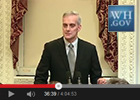 Earlier this week, I made the quick three-block trip from the NAFSA office to the White House for an energizing afternoon with government officials, media representatives, and travel bloggers. As an important driver of public opinion, the media have the ability to use their influential voices to educate readers about the importance of study abroad and encourage more U.S. students to engage in meaningful travel. This was the goal of the White House Summit on Study Abroad and Global Citizenship, to raise awareness of the benefits of cross-cultural education and cultural exchange, while boosting international student mobility across borders.
Earlier this week, I made the quick three-block trip from the NAFSA office to the White House for an energizing afternoon with government officials, media representatives, and travel bloggers. As an important driver of public opinion, the media have the ability to use their influential voices to educate readers about the importance of study abroad and encourage more U.S. students to engage in meaningful travel. This was the goal of the White House Summit on Study Abroad and Global Citizenship, to raise awareness of the benefits of cross-cultural education and cultural exchange, while boosting international student mobility across borders.
Study abroad is one of the best ways to provide students with the foreign language and cross-cultural skills necessary to compete and thrive in today’s global economy. Data from a recent MetLife survey show that 65 percent of Fortune 1000 executives identified global awareness as “very important” or “essential” in order to be ready for a career.
International experiences not only prepare students to succeed in careers, but also collectively strengthen our cultural diplomacy, national security, and the economy.
As I continue to reflect on the White House Summit, I’m reminded of President Obama’s continued leadership on creating a more globally engaged and welcoming United States. Here are just a few examples of the Administration’s accomplishments:
- The newly announced creation of a U.S. study abroad office at the U.S. State Department, as announced at this week’s White House Summit.
- The President’s strong leadership on comprehensive immigration reform and latest executive action.
- Creation of the Homeland Security Academic Advisory Council (HSAAC), which provides ongoing advice and recommendations to the Secretary on matters related to homeland security and higher education.
- Creation of the 100,000 Strong in the Americas Initiative to build critical ties between students and scholars in the United States, Latin America, and Canada.
- Opening up academic travel to Cuba.
- Extending visa validity for students, scholars, and professionals seeking to travel to and from China.
- Continued public support from Secretary of State John Kerry and Secretary of Education Arne Duncan for the importance of learning to compete and collaborate in a global society.
NAFSA has long advocated for these and other changes in policy around study abroad, and we applaud these accomplishments from the Administration. We also need the President’s continued leadership to increase diversity and access to study abroad and international education.
Right now, only 1% of U.S. students study abroad each year. To enhance America’s economic vitality, future security, and global leadership, we must exponentially increase study abroad opportunities for all students.
Find additional key NAFSA policy recommendations on the NAFSA website. These include the Senator Paul Simon Study Abroad Act, which would increase the number and diversity of students studying abroad, and broaden the destinations where they study.
But of course government cannot do this alone. We must continue to collaborate with our colleagues in government, business, media, and higher education institutions around the world.
Watch the White House Summit on Study Abroad and Global Citizenship on YouTube and read some of the tweets.
Marlene M. Johnson is CEO and Executive Director of NAFSA: Association of International Educators. Follow her on Twitter @MarleneAtNAFSA.
